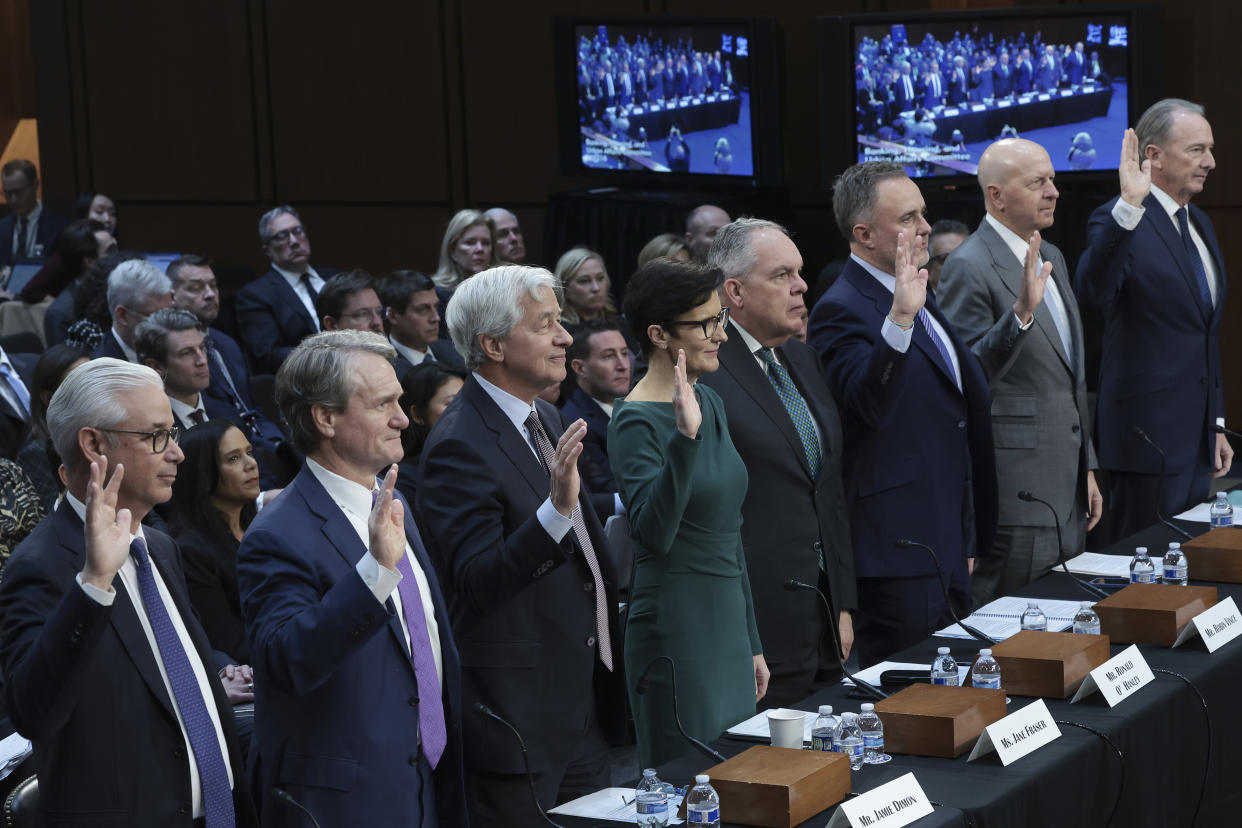'Hopefully it’s going to look very different': Lawmakers and CEOs push for changes in proposed banking rules
During Wednesday’s highly anticipated hearing with America’s big bank CEOs, the controversial capital requirements proposed by the Federal Reserve came up again and again.
While many staked out familiar positions, either fully in favor or fully opposed to the provisions, lawmakers in both parties as well as the assembled CEOs also pointed to areas where the proposed rules could be amended before they go into effect.
“Hopefully it’s going to look very different before it gets promulgated,” noted Sen. Thom Tillis (R-N.C.).
At issue are higher capital requirements that regulators are hoping to finalize in the coming months after they were unveiled this summer by Fed Vice Chair for Supervision Michael Barr. Those requirements focused on the amount of capital that banks must have in reserve to protect themselves from insolvency.
In the months since, the banks have launched a campaign to roll back the new rules — or scrap them entirely.
“We hope the Federal agencies will be open to changes and will review the industry’s comments thoughtfully,” added Morgan Stanley CEO James Gorman during his testimony.
Perhaps importantly, the proposed rules also came under scrutiny from moderate Democrats on the Senate panel who could be important to the debate in the weeks ahead as the Federal Reserve weighs the proposed changes to rule, known as Basel III endgame measures.
Figures like Sen. Mark Warner (D-Va.) and Sen. Jon Tester (D-Mont.) weighed in to raise concerns about things like how much the proposed regulations could spur the movement of additional financial services outside of the formal banking system.
“I think the timing at this moment is very problematic with interest rates as high as they are,” said Sen. Warner. But he also noted that the big banks object “anytime there is any proposed new regulation.”

Players in the financial sector have pushed for deep changes to the proposal. Meredith Whitney of Meredith Whitney Advisory Group told Yahoo Finance in an interview Wednesday (see video above) that the proposal was "hamfisted" and represents a "risk ... for the US consumer."
The proposal would raise banks' capital requirements by 16% in aggregate, and widen the scope of new requirements to institutions with as little as $100 billion in assets — an effort to include smaller banks like Silicon Valley Bank, which failed this spring.
All Republicans on the committee aligned on a letter released last month that calls on the Biden administration to withdraw the Basel III endgame entirely. Ranking member Tim Scott (R-S.C.) called Basel a “nightmare proposal” that will make it harder for average Americans to access loans.
Some GOP lawmakers tried to prod the Federal Reserve to make changes. “Regulation does not exist in a vacuum and the federal reserve must take this into account,” said Sen. Mike Rounds (R-S.D.)
Likewise, the assembled bank CEOs universally assailed the proposal, but signaled some areas that could get a second look in the weeks ahead.
Goldman Sachs (GS) CEO David Solomon used some of his time to argue that the more stringent market-making provisions in the rules were “particularly punitive” and could increase costs for consumers from airlines tickets to pension plans.
“These costs will likely get passed on to consumers,” he noted.
The hearing is part of Congress's annual oversight of the financial sector. It featured the industry's top bosses from Jamie Dimon of JPMorgan Chase (JPM) and Solomon to Brian Moynihan of Bank of America (BAC). The CEOs of Citigroup (C), Wells Fargo (WFC), State Street (STT), BNY Mellon (BK), and Morgan Stanley (MS) also appeared before the panel of 23 senators for questioning that covered an array of topics.
More left-leaning questioners gave the rules a warmer reception with Senate Banking Chair Sherrod Brown kicking things off by telling the assembled CEOs he thought their campaign against the tighter requirements was based on little more than profit.
“Absolutely nothing in these rules would stop your banks from making loans to working families,” he noted, slamming the bank’s lobbying efforts. He added that “you would rather fund risky trading and derivatives bets than boring, bread-and-butter small business lending.”

While Barr proposed the new outline this summer, not every member of the central bank has been onboard.
Fed Governor Christopher Waller recently called the proposal "excessive" in a conversation with the American Enterprise Institute. He told the think tank last week that if the proposal did away with separate requirements for so-called operational risk — risk from potential losses from disruptions due to internal mismanagement like fraud, or external shocks like a cyberattack — that he could support the proposal. The capital requirement for operational risk is a major sticking point with the banks.
There is also a broader sense that changes could be in the offing. "Michael Barr knows he went too far on a few things," said David Wessel, a senior fellow in economic studies at the Brookings Institution, in an interview this week before the hearing. He predicted that regulators will look at issues like operational risk and debate "you should fix this or you should fix this" in the months ahead as lawmakers work to finalize the proposal.
Click here for in-depth analysis of the latest stock market news and events moving stock prices.
Read the latest financial and business news from Yahoo Finance
